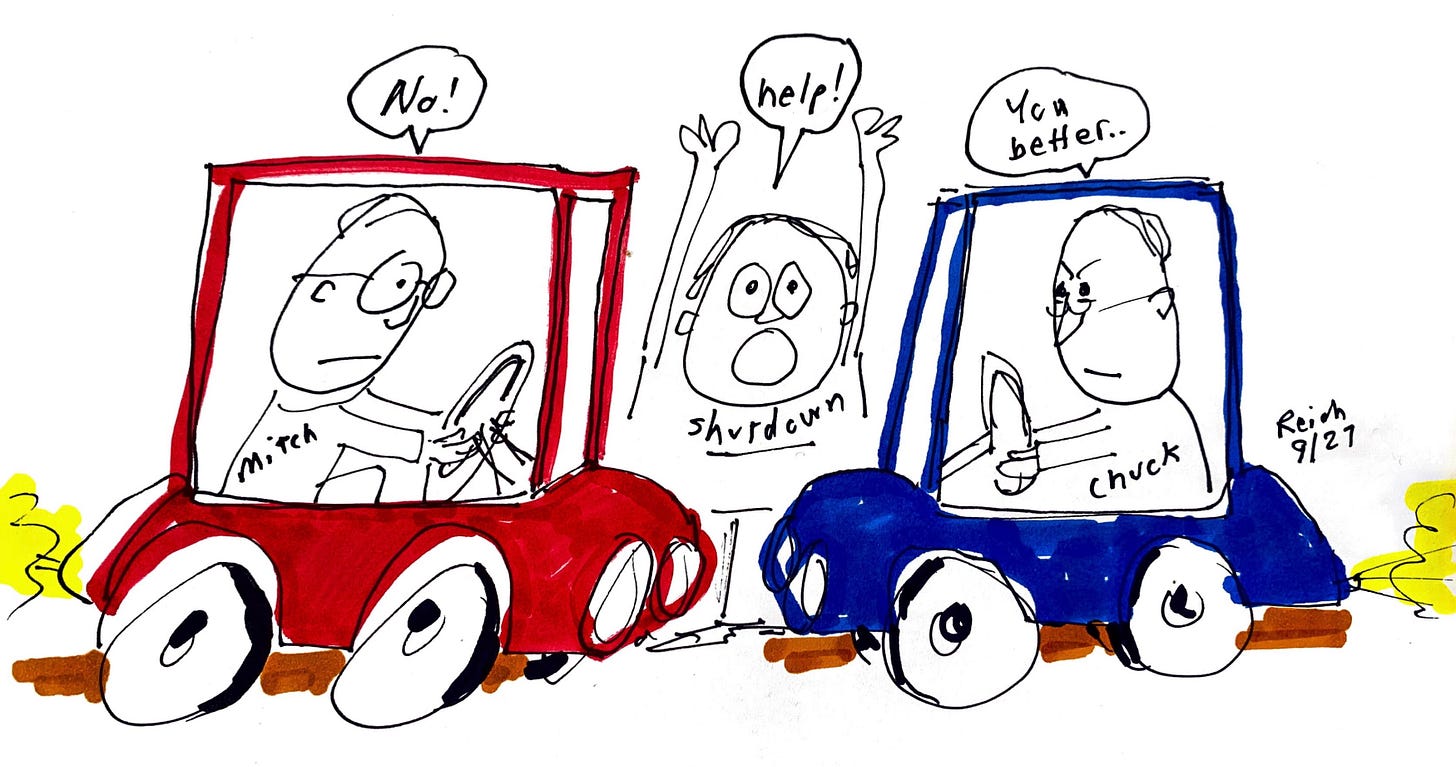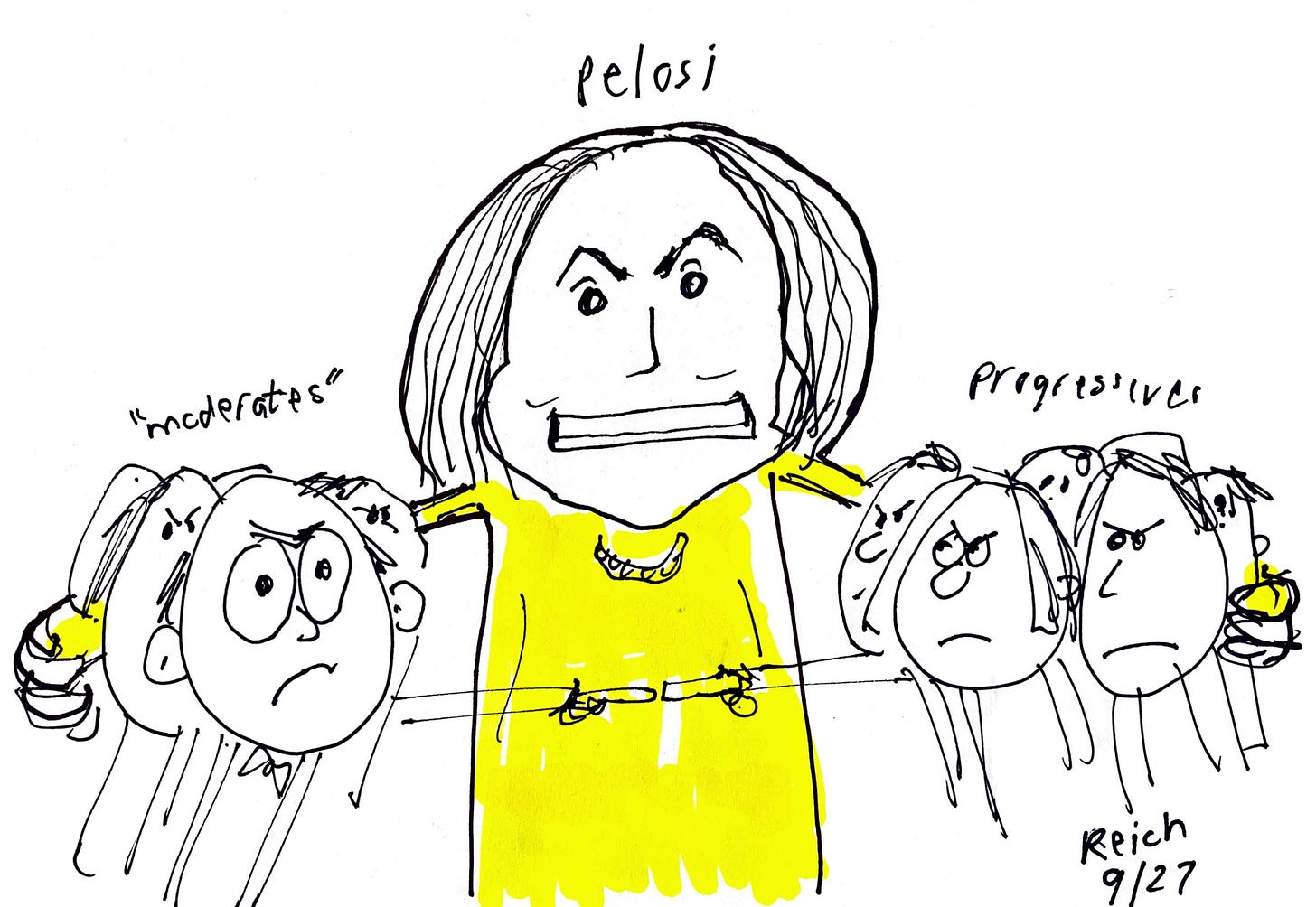This week, we’re going to witness two high-stakes games of chicken.
1. The first game will be between Senate Democrats and Senate Republicans over raising the debt ceiling and extending funding the government beyond Thursday.
These two issues are really quite different: Funding is the more immediate need because if no agreement is reached by Thursday night, the government will shut down. The debt ceiling doesn’t have to be raised until the Treasury runs out of money to pay the government’s bills, which won’t happen until mid or late October.
As I said last week, raising the debt ceiling is about paying for spending that’s already occurred. A higher debt ceiling doesn’t authorize new federal spending; it’s about past spending. Raising it simply allows the government to pay its bills. Failure to raise it by the time the Treasury runs out of money would mean a cataclysmic default by the United States, which has never happened before.
On the other hand, funding the government is about future spending, starting Friday. Without new funding authority, the government can’t spend a dime. This will result in a shutdown. We have been through several in recent memory (I was in two of them when I ran a cabinet department, and I can tell you they aren’t pretty). Some Americans don’t get the services they depend on. Government workers don’t get the paychecks they depend on.
Oh, and there’s a political cost. Generally speaking, the party that voters blame for causing a shutdown is penalized in the next election. (Remember Newt Gingrich?)
So what’s behind this first game of chicken?
Republicans don’t want to be seen raising the debt ceiling because they want to run in next year’s midterm elections on “fiscal prudence.” (Ironic note: most of the debt piled up since the debt ceiling was last raised came from Trump and Republican lawmakers). And 99 percent of the public mistakenly believes the debt ceiling is about future spending.
Which is exactly why Democrats would rather collapse the two issues together, thereby forcing Republicans into the awkward position of either voting to raise the debt ceiling or causing the government to shut down.
The House has already bound the two issues together by passing a bill to fund the government through early December that includes an increase in the debt ceiling (as well as disaster relief).
In this game, Senate Democrats are daring Republicans to publicly vote against the combined bill – and thereby cause a shutdown. (If Republicans refuse, the only way to avoid a shutdown is for Nancy Pelosi and House Democrats to quickly pass a new resolution without the debt-ceiling provision -- which Senate Republicans have said they’ll sign.)
In the meantime – to increase the pressure -- the Office of Management and Budget has given federal agencies instructions for what to do in case of a shutdown.
2. The second high-stakes game of chicken this week is between Democrats in the House: between progressives and so-called “moderates.”
House Speaker Nancy Pelosi, you may recall, promised that the two giant bills now moving through Congress would be voted on together in the House – the $1.2 trillion infrastructure bill that’s already passed the Senate, and the $3.5 trillion “Build Back Better” plan containing the rest of Biden’s agenda (which can only get through the Senate as a “reconciliation” bill requiring a bare majority).
She promised this because House progressives refused to vote for the infrastructure bill without a simultaneous vote on the larger bill, out of fear that moderates would approve infrastructure but then balk at the rest. Yet to be responsive to House moderates, she promised a vote on infrastructure by September 27. (She has now scheduled the vote for Thursday.)
The problem, of course, is she can’t deliver on both promises because the $3.5 trillion Build Back Better plan isn’t ready. Yet if Pelosi follows through and schedules a vote on infrastructure without Build Back Better, progressives are threatening to vote against the infrastructure bill — which could kill the infrastructure bill because Democrats have a small 3-vote lead over Republicans in the House, and it’s unlikely Republicans will vote for the bill.
But unless Pelosi schedules a vote on infrastructure today (or very soon), roughly a dozen House moderates are threatening to vote against the bigger Build Back Better bill when it comes up.
Oy.
Here’s the bottom line: Neither of these games of chicken would be as fraught if Democrats were united. But even though they hold narrow majorities in both the House and Senate, they aren’t united. They’re less unified than Republicans.
Mitch McConnell and Kevin McCarthy (Senate and House Republican leaders, respectively) simply snap their fingers, and Republicans get in line. But Chuck Schumer and Nancy Pelosi (the Democratic leaders) snap their fingers and Democrats go their separate ways. Biden snaps his fingers and congressional Democrats politely yawn.
Why this asymmetry? I suspect it’s because Republicans are by nature authoritarian. (That’s a big generalization, but from my experience I believe it’s an accurate one.) They’re disciplined. They march together.
On the other hand, Democrats by nature are anti-authoritarian. They’re undisciplined. They “let a thousand flowers bloom.”
Make no mistake: This asymmetry could destroy Biden’s entire agenda – and thereby undermine America’s future. The stakes couldn’t be higher. To paraphrase Benjamin Franklin (or what he was reputed to have said), they must all hang together, or they shall all hang separately.”
If you were in the Democratic leadership now, what would you advise?












